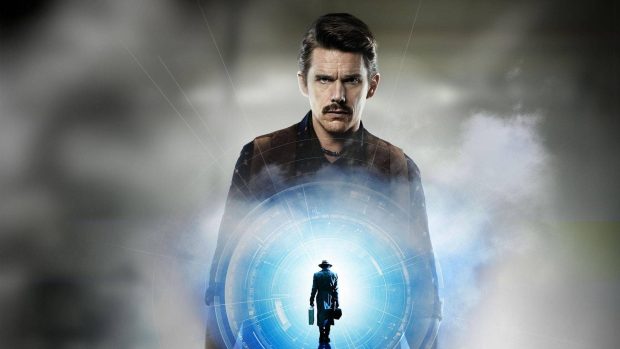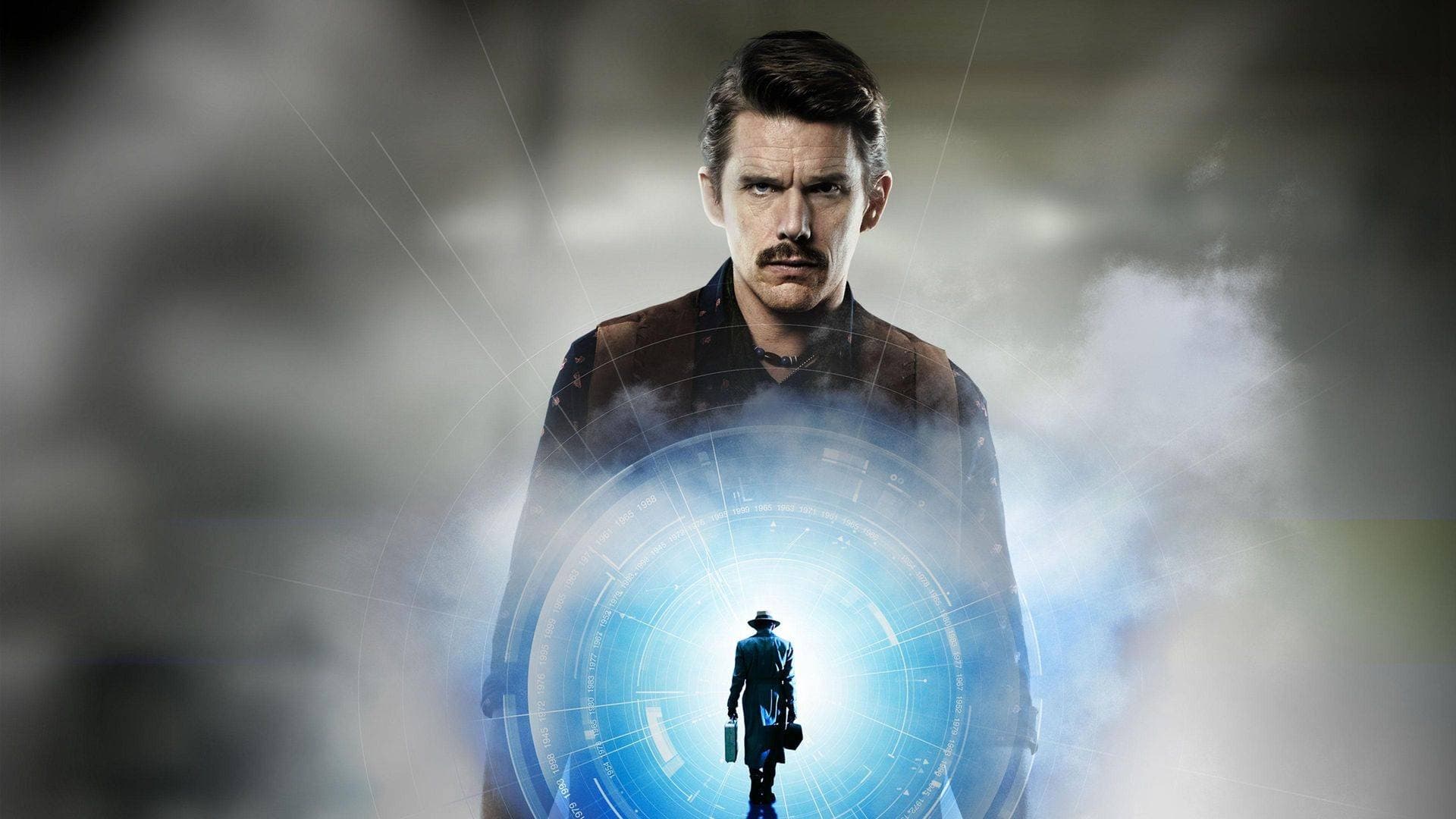In the realm of science fiction cinema, few films dare to tangle with the intricacies of time travel as boldly as ‘Predestination’. Released in 2014, this Australian thriller, directed by Michael and Peter Spierig, immediately throws audiences into a vortex of paradoxes and mind-bending concepts. For viewers seeking a straightforward, easily digestible narrative, ‘Predestination’ might feel like navigating a labyrinth in the dark. The film demands attention, rewarding those who lean into its complexities while potentially frustrating those who prefer a more linear and predictable storyline. Is it a cerebral masterpiece that expands the boundaries of sci-fi, or does it ultimately succumb to its own tangled web, leaving viewers more confused than enlightened?
The initial moments of ‘Predestination’ are intentionally disorienting. We are introduced to a temporal agent, portrayed with captivating intensity by Ethan Hawke, tasked with preventing a devastating bombing in 1975 New York. However, this is not your typical time-travel mission. The agent’s journey becomes an intricate dance through time, where identities blur and causality itself seems to unravel. As the narrative unfolds, we are presented with a series of perplexing events, each layer adding to the film’s enigmatic core. The question is not merely about preventing a crime, but about the very nature of time, identity, and destiny.
‘Predestination’ (2014) is more than just a time-travel movie; it’s an exploration of profound philosophical questions wrapped in a thrilling sci-fi package. With a rating of 8.5 and starring Ethan Hawke, Sarah Snook, and Noah Taylor, this film has garnered significant praise for its intellectual depth and narrative audacity. Many viewers find themselves captivated by its intricate plot, while others might struggle to grasp its non-linear structure. This review delves into the fascinating paradoxes at the heart of ‘Predestination’, aiming to decipher whether its mind-bending narrative ultimately elevates it to a masterpiece or leaves it teetering on the edge of convoluted confusion. Let’s explore the intricate tapestry woven by this film and determine if it’s a journey worth taking for fans of cerebral cinema.
Unraveling the Time Travel Paradoxes of ‘Predestination’
At its core, ‘Predestination’ grapples with the bootstrap paradox, a concept that challenges our understanding of cause and effect in time travel. This paradox occurs when an object or information is sent back in time, creating a loop where the object or information has no discernible origin. In ‘Predestination’, this concept is not just a theoretical backdrop; it’s woven into the very fabric of the narrative, becoming the central engine driving the plot and character development. The film masterfully uses this paradox to explore themes of identity and self-creation in ways rarely seen in mainstream sci-fi.
The Bootstrap Paradox in Action: The Ouroboros of Time

‘Predestination’ doesn’t just mention the bootstrap paradox; it embodies it. The narrative structure itself mirrors the cyclical nature of this paradox, constantly looping back on itself and revealing new layers of interconnectedness. Characters find themselves in situations where they are both the cause and the effect of events, blurring the lines of linear time. This creates a sense of temporal ouroboros, a snake eating its own tail, representing the self-sustaining and origin-less nature of the paradox. The film cleverly uses this cyclical structure to keep the audience engaged, constantly prompting them to re-evaluate their understanding of what they’ve seen.
Identity as a Temporal Construct
Beyond the mechanics of time travel, ‘Predestination’ delves deeply into the theme of identity. The film challenges the notion of a fixed, singular self, suggesting instead that identity might be fluid and shaped by temporal interactions. The characters’ journeys through time are not just physical displacements but also transformations of their very being. As they encounter past and future versions of themselves, their sense of self becomes fragmented and reassembled in unexpected ways. This exploration of identity as a temporal construct elevates ‘Predestination’ beyond a simple sci-fi thriller, turning it into a profound meditation on the nature of selfhood.
Performances that Anchor the Paradox
The success of ‘Predestination’ in conveying its complex themes hinges significantly on the performances of its lead actors. Ethan Hawke delivers a nuanced portrayal of the temporal agent, capturing the weariness and philosophical burden of someone who has navigated the complexities of time travel for too long. Sarah Snook, in a truly remarkable performance, embodies the multifaceted nature of her character with incredible depth and versatility. Her ability to portray different facets of a complex identity is crucial to the film’s impact. Noah Taylor, as Robertson, provides a steady and grounded presence, acting as a guide through the labyrinthine plot. The chemistry and individual performances of these actors ground the often abstract concepts of time travel and paradox, making them emotionally resonant.
Practical Tips for Navigating ‘Predestination’
To fully appreciate ‘Predestination‘, viewers should be prepared for a non-linear narrative that demands close attention. Here are some tips to enhance your viewing experience:
Attention to Detail is Crucial: Pay close attention to dialogue, visual cues, and seemingly minor details. ‘Predestination’ is a film where every piece of information, no matter how small, can be significant in understanding the larger puzzle.
Embrace the Confusion: The film is intentionally disorienting at times. Instead of fighting the confusion, embrace it as part of the intended experience. The unraveling of the mystery is a gradual process, and the film rewards patience and persistent observation.
Rewatchability Factor: ‘Predestination’ is a film that benefits from multiple viewings. On a second or third viewing, you’ll likely notice nuances and connections that were missed initially. The intricate plot reveals new layers with each watch, making it a film that stays with you long after the credits roll.
Discuss and Reflect: After watching ‘Predestination’, engaging in discussions about the film’s themes and plot points can be highly rewarding. Sharing interpretations and perspectives can help to solidify your understanding and appreciation of its complexities.
Open to Interpretation: ‘Predestination’ is not a film that provides easy answers. It leaves room for interpretation and invites viewers to contemplate the philosophical implications of its time-travel concepts. Be open to different readings and appreciate the ambiguity that is intentionally woven into the narrative.
The Ending’s Impact: The ending of ‘Predestination’ is designed to be both shocking and thought-provoking. It ties together the various threads of the narrative in a way that challenges conventional storytelling. Reflect on the ending and how it recontextualizes the events that precede it.
‘Predestination’ is not designed to be passively consumed. It’s a film that actively engages the viewer, demanding participation in deciphering its intricate puzzle. For those willing to invest the mental energy, the rewards are significant.
Ultimately, ‘Predestination’ stands as a testament to the power of intelligent science fiction. It’s a film that dares to be complex, challenging, and ultimately rewarding for those who appreciate a narrative that bends the mind and provokes deep thought. If you are seeking a cinematic experience that transcends the typical sci-fi tropes and delves into profound questions about time, identity, and destiny, then ‘Predestination’ is an absolute must-watch. Prepare to be challenged, intrigued, and perhaps even a little bewildered, but undoubtedly captivated by this cerebral masterpiece. Don’t just watch ‘Predestination’; experience it, dissect it, and let it reshape your perceptions of time and self.




